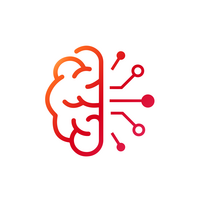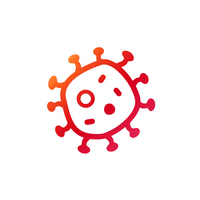
Azrieli Accelerator Catalyst Grants
The Azrieli Accelerator Catalyst Grant is hands down the only way we can answer our scientific question."
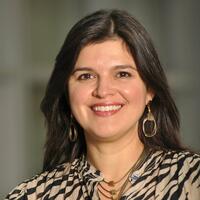
Dr. Marie Arrieta, PhD
Associate Professor, Cumming School of Medicine, 2023 Azrieli Accelerator Catalyst Grant Recipient
Want to connect? Email us
Creating impact
Explore some of the projects that Azrieli Accelerator Catalyst Grants have supported
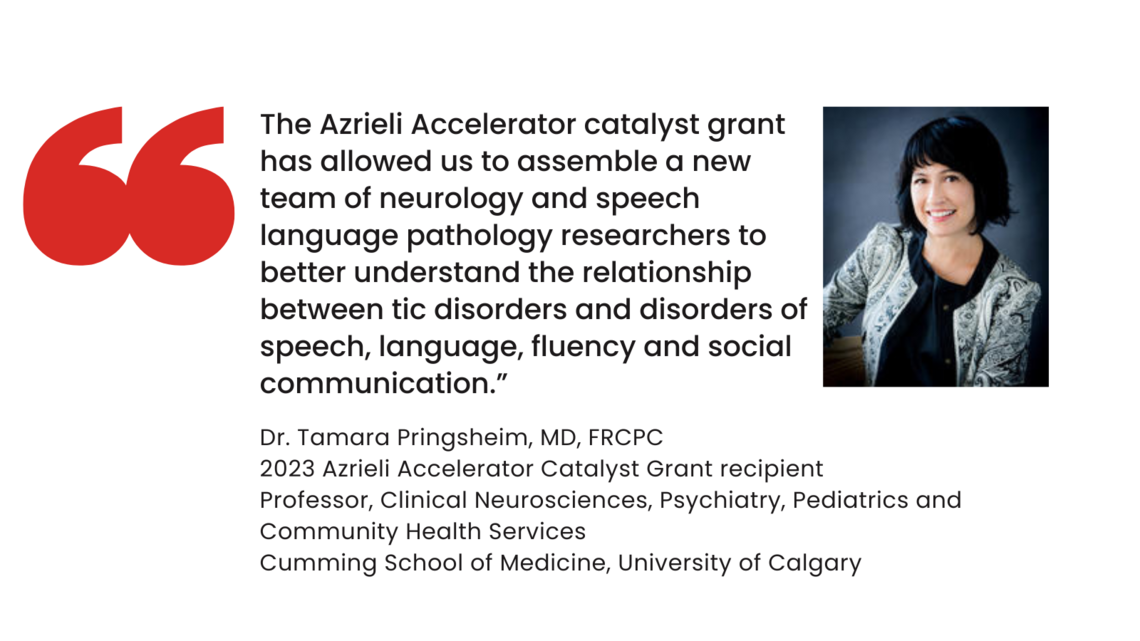
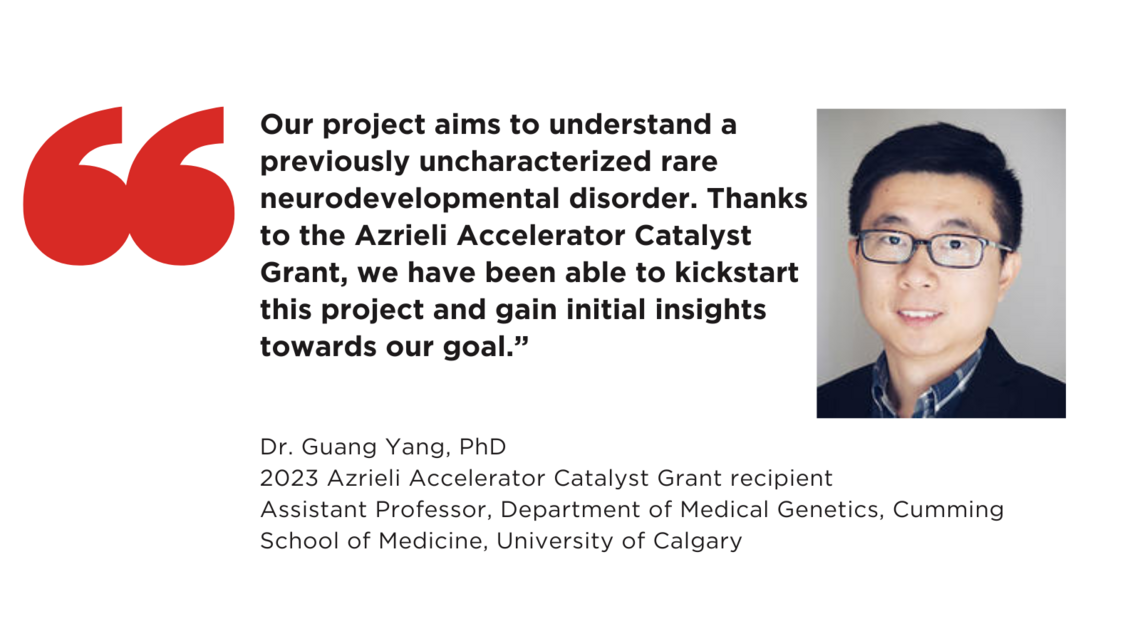
2023 Azrieli Accelerator Catalyst Grant Recipients
Project title: Influence of microbiome maturation in preterm infants on brain growth and neurodevelopment
-
Description
This project collaborates with the Alberta BLOOM study, which is researching the early-life microbiome of premature and term infants. With this grant, the team will look at how gut microbiome maturation leads to differences in brain development in animal models. Using MRI and other lab-based techniques, the team will look for changes in brain volume, ventricular volume, white matter development and microglial activation.
-
Research team
- Marie-Claire Arrieta, Department of Physiology & Pharmacology
- Jeff Dunn, Department of Radiology
- Van Ortega, Postdoctoral Fellow
Project title: Gene regulation in brain development and disease
-
Description
This team is studying the mechanism of a newly characterized neurodevelopmental syndrome, identified through collaborations between the clinic and the research lab. This funding will enable the team to collect critical in vivo and in vitro functional data concerning the role of a gene (PRPF4B) in neural stem/precursor cell fate decisions, as well as understand the mechanistic impact of patient derived mutations through the creation of a relevant mouse genetic model.
-
Research team
- Guang Yang, Department of Medical Genetics
- Micheil Innes, Department of Medical Genetics
- Xiao-Ru Yang, Genomics and Neurogenetics Fellow
Project title: Exploration of perinatal inflammatory market profiles in moderate to late preterm infants
-
Description
Infants born “moderate to late preterm” (between 32-36 weeks) have a four-fold higher risk of long-term neurodevelopmental, behavioural and mental health problems compared to full-term infants. This study will explore inflammatory profiles and their potential role in disrupting brain development. They aim to enable early prediction of disruptions that can lead to life-long neurodevelopmental challenges through the testing of perinatal biomarkers. Through this work, they seek to identify who is most at risk, and which kinds of therapies can best modify that risk.
-
Research team
- Lara Leijser, Department of Pediatrics
- Michael Esser, Department of Pediatrics
- Donna Slater, Department of Physiology & Pharmacology
- Xing-Chang Wei, Department of Radiology
- Tekougang Theirry Chekouo, Department of Mathematics & Statistics
- Amy Metcalfe, Department of Obstetrics & Gynaecology
- Debbie McNeil, Department of Community Health Sciences
Project title: Language, social communication and fluency in children with Tourette Syndrome
-
Description
Speech and language disorders impact all areas of day-to-day functioning and respond well to interventions during early development. This research will provide needed information about the nature of speech and language disorders in young people with Tourette Syndrome and can provide a foundation for planning appropriate early interventions.
-
Research team
- Tamara Pringsheim, Department of Clinical Neurosciences
- Davide Martino, Department of Clinical Neurosciences
- Angela Feehan, Speech pathologist, PhD student
- Monique Charest, University of Alberta
Project title: Ready Player One - Incorporating gamification into an online tutorial to support the transition to postsecondary education for students who are neurodivergent
-
Description
This project will design, pilot and evaluate a self-paced online tutorial to support the transition to postsecondary education for students with learning disabilities and ADHD. The gamified tutorial will target high school students in grades 11 and 12 who are planning to attend postsecondary. The game will be evaluated with partners from Foothills Academy School, a private school in Alberta dedicated to students with learning disabilities.
-
Research team
- Meadow Schroeder, Werklund School of Education
- Richard Zhao, Department of Computer Science
- Lauren Goegan, University of Manitoba
- Tanya Keto, Foothills Academy Society
Project title: Addressing the mental health of neurodiverse youth - The role of community-based adapted physical activity programming.
-
Description
Physical activity is one accessible and modifiable lifestyle factor that has been shown to improve mental health among neurodiverse youth. This project is partnered with Calgary Adapted Hub, powered by Jumpstart (2020-2025), which provides inclusive and accessible sport and recreation programming in Calgary, bridging research and community programs. This project will quantify the impact of participation in physical activity on mental health outcomes among neurodiverse youth. They’ll also look at the impact of environmental factors (family support, income, parental education) on those outcomes.
-
Research team
- Carolyn Emery, Faculty of Kinesiology
- Daniel Kopala-Sibley, Department of Psychiatry
- Meredith Maroney, Werklund School of Education
- Kelly Arbour-Nicitopoulos, University of Toronto
- Laura Brunton, Western University
- Amy Latimer-Cheung, Queen’s University
- Jennifer Leo, University of Alberta
- Janet McCabe, Ontario Tech University
- Nancy Quinn, Western University
Project title: Machine learning-based interpretable pediatric brain age prediction using multimodal neuroimaging data: A powerful tool to analyze neurodevelopment
-
Description
Working with partners in the Child and Adolescent Imaging Research group at Alberta Children’s Hospital, this team will develop a pediatric brain age prediction model to serve as a valuable tool to assess and analyze brain maturation and to accurately quantify deviations from typical development. This group has already developed a novel machine learning method for brain age prediction in adults that is highly accurate (competitive age prediction error of approx. 4 years). This funding will enable new work with a pediatric population.
-
Research team
- Matthias Wilms, Department of Radiology
- Nils Forkert, Department of Radiology
- SigneBray, Department of Radiology
- Catherine Lebel, Department of Radiology
- Ashley Ware, Department of Psychology
- Keith Yates, Department of Psychology
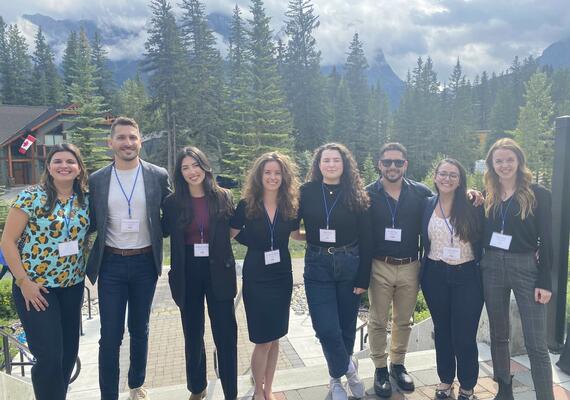
Collaborations across UCalgary exploring neurodevelopment
First recipients of Azrieli Accelerator Catalyst Grants leverage expertise and partnerships to advance important research

